Ever since I had my alarm going off in my septic system in our new home in Lewes, I have been wondering what kind of things could go wrong with it. Today, I’d like to know if my toilet cleaner can damage the septic system.
Every cleaner and substance you use and then dispose of down the drain, or a toilet, can affect your septic system. Unfortunately, some of the cleaners that do a great cleaning job can negatively affect your septic system.
Toilet cleaners based on bleach and chlorine can harm your septic system. These chemicals can kill useful bacteria and prevent the natural treatment of waste, which may result in waste solids, grease, and oils being pushed into the drain field. It could also cause blockages and backups into the house.
Some homeowners underestimate this problem because they don’t see inside of a septic system and think that everything is fine. Other homeowners like me are new to septic systems and have never had to think about this in the past because the city sewage handled it. When the issue becomes apparent, it is usually too late, and the repairs are quite expensive.
Let’s understand the impact of harsh chemicals on the septic system and how to prevent potential issues.
The Negative Impact of Bleach-Based Cleaners on the Septic System
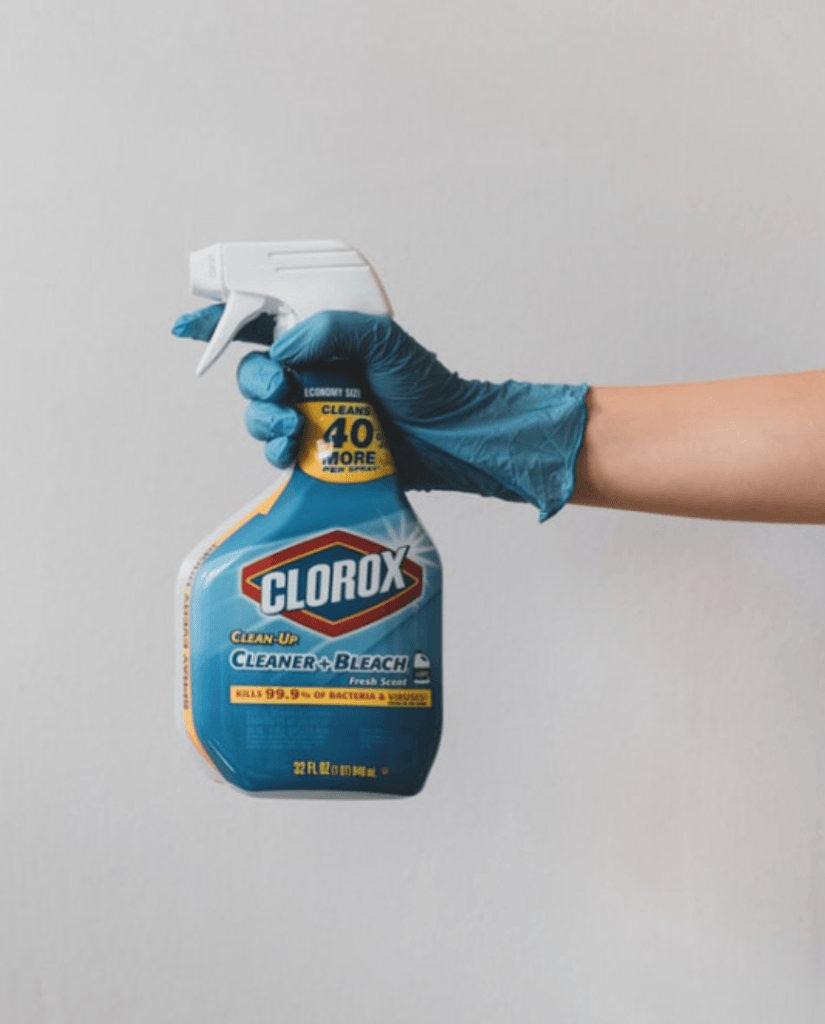
Every septic system contains millions of good bacteria that naturally and slowly break down and treat solid waste from your home.
The resulting liquid (effluent) can safely end up in the drain field for further treatment by the soil.
When you use cleaners that contain chlorine and bleach, you are introducing an unnatural substance that kills the bacteria in the system. Regular use of this type of cleaners will slow down or even prevent waste treatment.
When the beneficial bacteria die, waste builds up in the tank. Because the quantity rises, grease, oils, and other substances may end up in the drain field. If that happens, you will notice slow drainage and water around the drain field. This occurrence can seriously harm the septic system, and you are likely to spend a lot of money to fix it.
If you use bleach-based cleaners occasionally, they will not have a large effect in very small quantities, but everyday usage could have a material impact to your septic system.
Note that the toilet is only one-way things end up in the septic tank. If you use bleach to clean your bathtub or showers, it will end up in the septic system through another drain. So, you should also consider that.
Septic-Safe Toilet Cleaners and Cleaning Methods
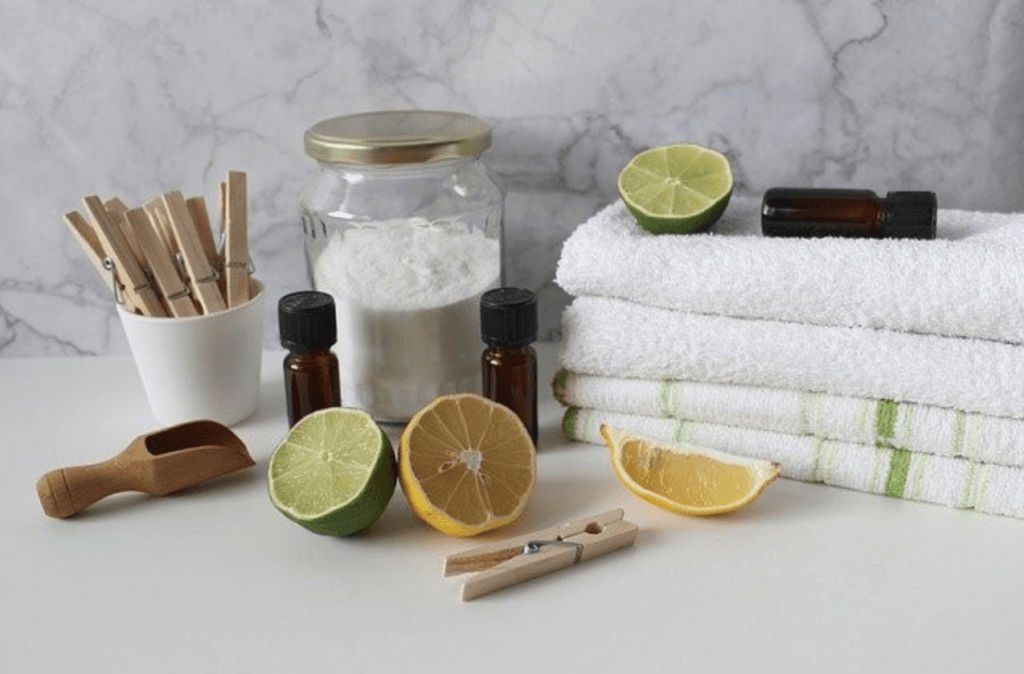
To keep your septic system in good working condition, try using eco-friendly and biodegradable products. These cleaners are available in many stores, and the prices vary, but you can choose an option that suits your needs.
Environmentally-friendly and non-toxic toilet cleaners have many benefits. Some homeowners are skeptical and think that those cleaners can not do the job correctly. That is a common misconception, and rest assured, these cleaners are as good as those based on harsh chemicals. If you are cleaning the toilet regularly, you will notice that those products are equally efficient.
However, for deep and meticulous cleaning, you will have to scrub harder. Natural cleaners lack chemicals that dissolve all kinds of residue and impurities within seconds. This is only necessary for toilets that haven’t been used for a long time, or in bathrooms used by previous tenants if you just moved in.
Besides being safe for septic-system and the environment, these products are safer for you too. Touching and inhaling bleach or chlorine can have negative health effects, especially for sensitive people.
Instead of buying cleaning products, you may want to make your own cleaners. Below are some options:
Baking Soda
This natural cleaner has been used for bathroom and toilet cleaning for decades. It is abrasive when used in its dry form, it will help you scrub the toilet, and its natural deodorizing feature will remove any bad smell. To use it in a toilet, take a cup of baking soda and sprinkle across the toilet bowl. Take a toilet brush and scrub it. Remove the soda leftovers from the toilet seat with a cloth if necessary.
To remove the odors coming from pipes, mix one cup of baking soda with two cups of water and pour it in the toilet. Flush after a few minutes. Both of these methods can be used daily and have no negative impact on the septic system.
Lemon Juice
Lemon has a pleasant smell that will make your toilet fresh and odor-free. Many commercial toilet cleaners are lemon-scented, but the real lemon juice is entirely harmless. It is very acidic, and it will prevent bacteria build-up on your toilet seat. These antibacterial properties are not strong enough to kill the bacteria within the septic system, so it is safe to use it. Just pour 2 cups inside the toilet bowl and scrub it with a brush.
White Vinegar
This natural cleaner is popular in many cultures and used for all kinds of cleaning purposes. Some use it as a vinyl floor cleaner; others use it as a fabric softener. And of course, it is excellent as a toilet cleaner. Some people dislike the strong smell, but it has natural antibacterial properties to clean the toilet bowl.
Those properties are not hard enough to kill the bacteria inside the septic system. It will also remove limescale, and the toilet bowl will look shiny and brand-new. The smell of white vinegar will remove any unpleasant odor from the toilet too.
And how to use it? Just pour 2 cups of it into the toilet bowl and scrub it with a brush. For severe cases of limescale, leave it overnight.
Borax
Called sodium borate, this chemical compound has similar cleaning characteristics as baking soda. It is a bit more efficient for toilets, and it is easy to use. You should mix half a cup of borax with water, and pour it inside the toilet. Brush the toilet and flush it. This will remove all the small stains and odors, leaving the toilet clean and fresh.
In addition to being safe, these natural cleaners are also inexpensive. If you ever feel like you need a stronger cleaner, you can always use one of the septic-safe products available in stores. But for maintaining a clean toilet, those mentioned above are sufficient.
Cleaners and Chemicals to Avoid
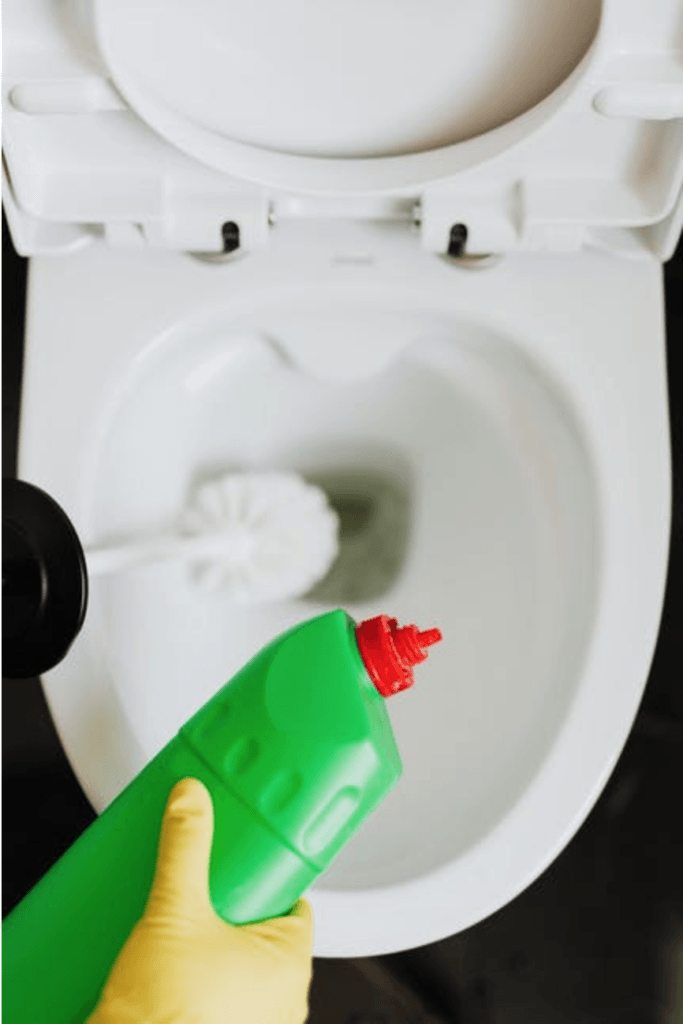
Everything that ends up in the septic system goes into the environment. Using safe cleaners is essential to protect nature, too, not just to have a system in working condition for your needs.
And it’s not just toilet cleaners. Some people will flush many harmful substances down the toilet, from kitty litter, to paint or other chemicals. Be mindful when disposing of dangerous materials.
When it comes to toilet cleaners, here are the ones to avoid:
Chlorine and Bleach-Based Cleaners
As already mentioned, this type of cleaners kill useful bacteria. Besides that, these chemicals are very harmful to aquatic creatures, in both fresh and saltwater. This is especially important if your property is located near rivers or lakes. In that case, the bleach from your septic system will eventually end up in the water.
Chlorine or bleach can also affect water sources for human consumption, such as wells.
Drain Cleaners
When your toilet gets clogged, pouring a bottle of chemical cleaners may seem like the easiest way to resolve the problem. Like the previously mentioned chemicals, strong drain cleaners will kill useful bacteria in your septic tank and end up in the environment.
Antibacterial Cleaners
These may sound like excellent toilet cleaning products. We all know that hygiene is very important; however, they will kill the bacteria in your septic tank and may cause all sorts of septic system problems.
Antimicrobial Products
Many cleaners available on the market contain antimicrobial agents and preservatives. Some of them can cause allergies, but most importantly, they are extremely harmful to the environment.
Solvents or Thinners
Some people think that those products will somehow magically dissolve limescale, but in reality, it will just kill the bacteria in your septic tank and cause damage to the environment.
How to Prolong Your Septic System Life
These are a few more tips on how to take care of your septic system:
- Complete annual inspections. The National Onsite Wastewater Recycling Association has a septic locator to find service professionals in your area.
- Follow a pumping schedule to ensure that your septic tank solids are pumped out regularly, typically between 3-5 years.
- Use a thinner toilet paper that dissolves quickly.
- Don’t flush dangerous materials and solids down the toilet.
- Conserve water. Using less water may increase the life of your septic system. You will also save money.
- If you have a guest bathroom, and it is not used regularly, flush the toilet once in a while to maintain a healthy flow, and remove gases.
- Minimize the flushing of detergents and other cleaners (e.g., floor cleaners after mopping the floors) and use safe cleaners around the house, not just in a bathroom.
This may seem like too much hassle for those used to city sewage, but it is relatively easy to get used to. Septic systems also have advantages, and taking care of them becomes a habit very fast.
Related Posts:
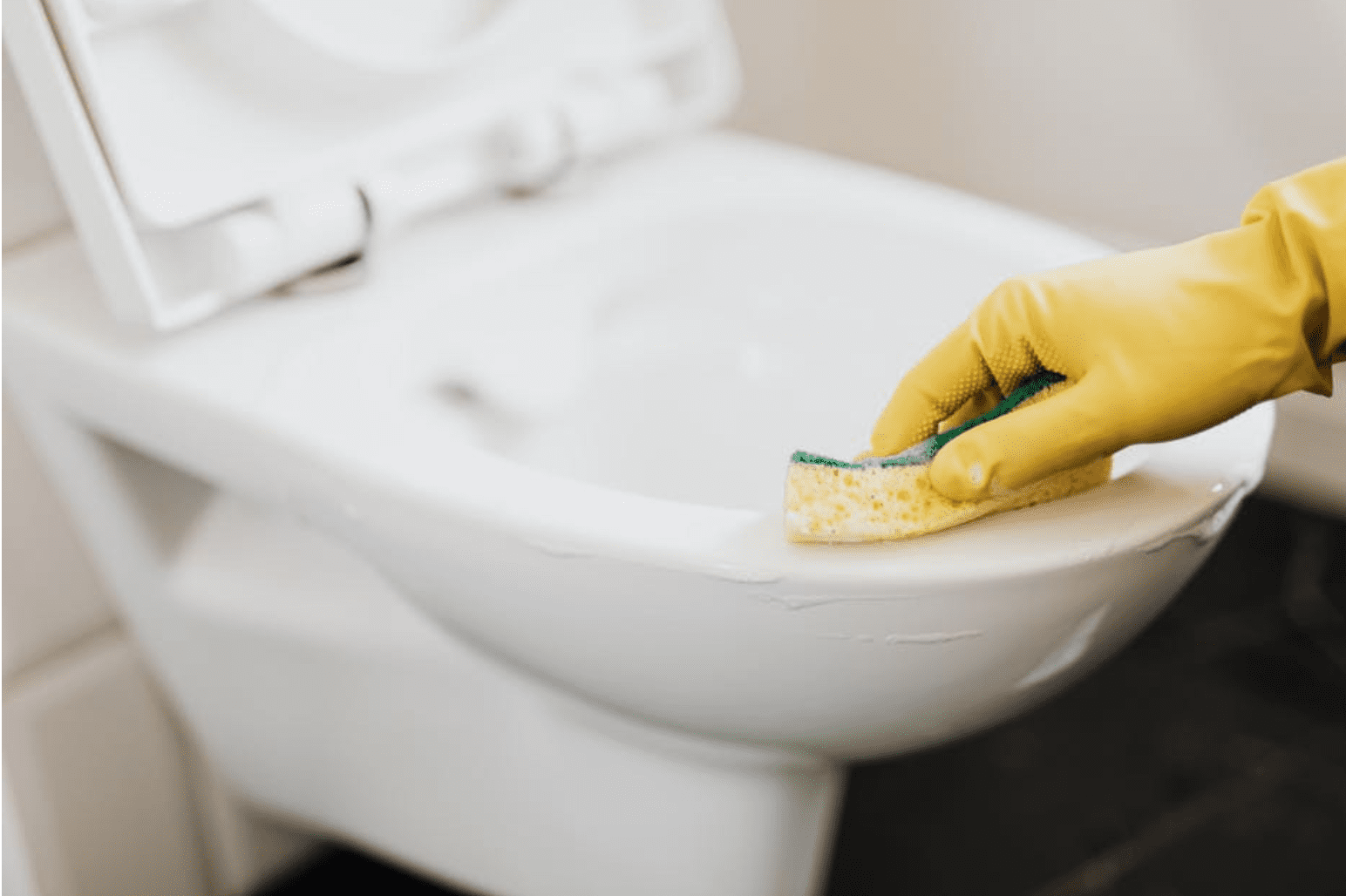
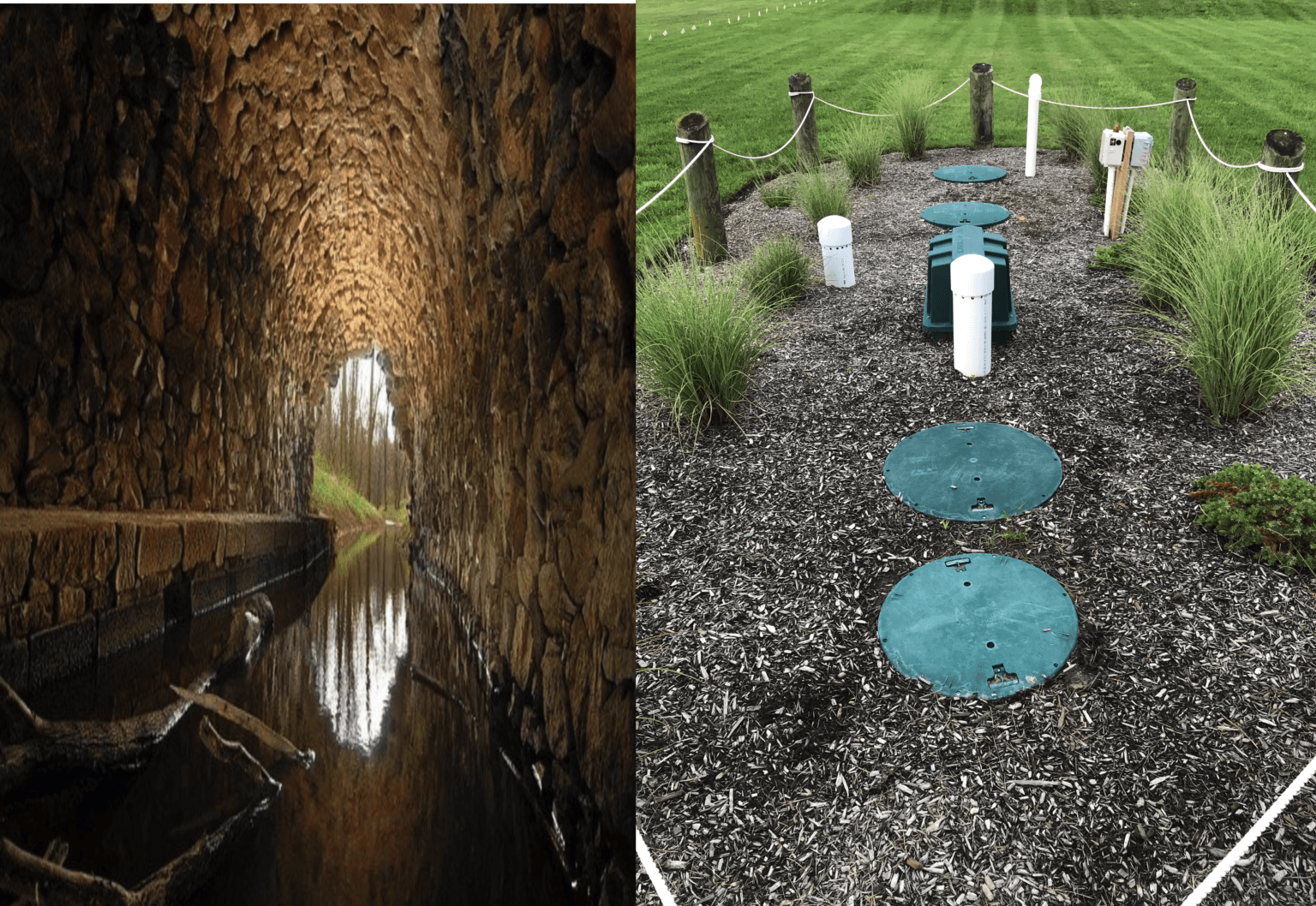
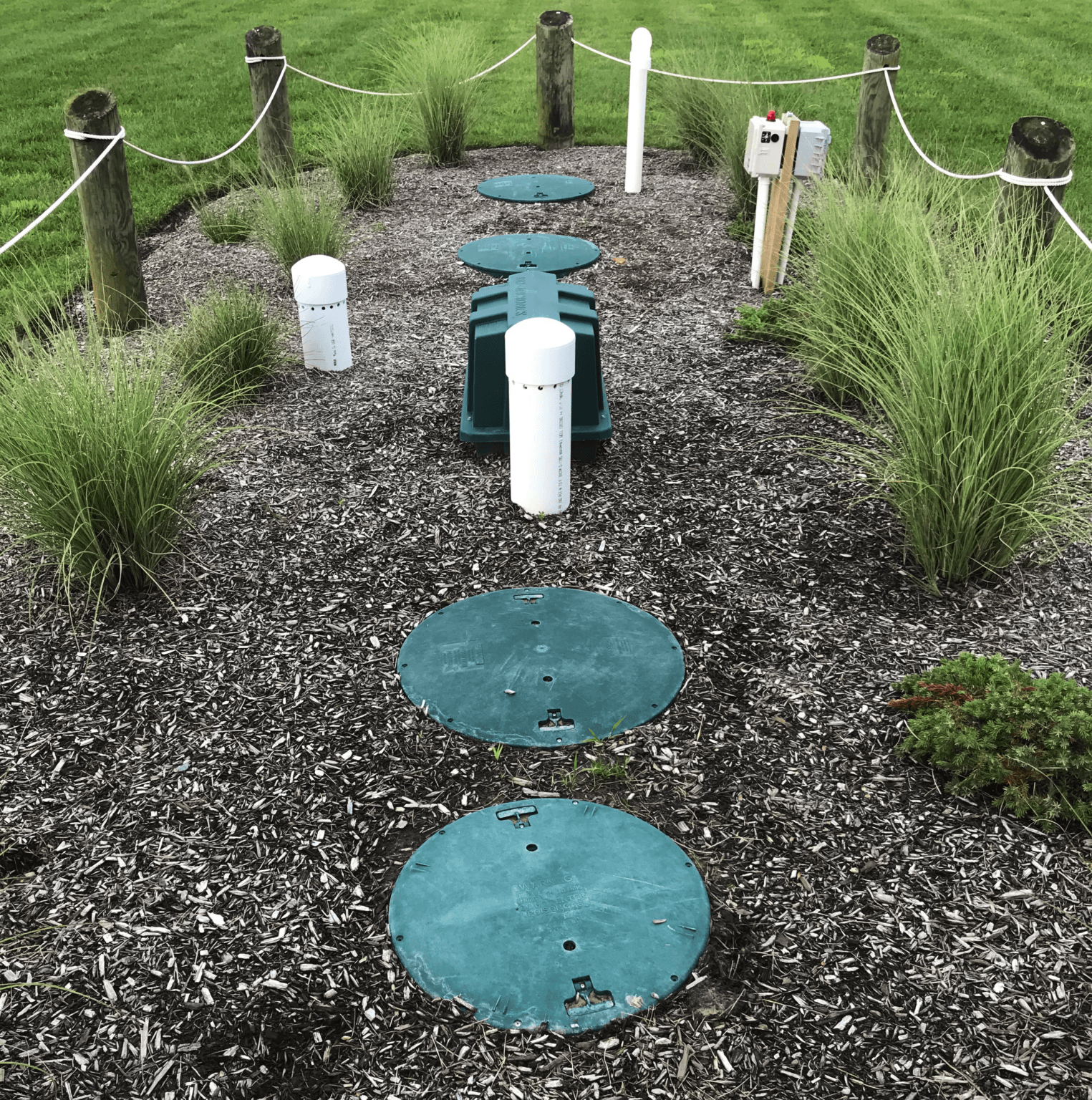

Hi,
We’ve lived in this house with a septic system for about 4 years and I have never actually considered what products I use. Now, after reading this, and realizing how many times I’ve bleached the sink or something similar and I’m wondering what I can do to improve the health of the system. When I have spoiled milk or old yogurt I try to save them till evening and then rinse them down so they can sort of sit for a while and grow some bacteria but that is all I’ve ever done, and I don’t do it regularly. What else can I do to be proactive now that I’ve already done damage, and probably quite a bit of it? Thank you.
Hi Lori,
Thank you for stopping by.
I am not an expert on septic systems, but my understanding is that adding products to try to improve the good bacteria doesn’t help much.
On the other hand, the EPA and other sources recommend getting septic systems inspected and pumped every 3 to 5 years. If you haven’t done that yet, perhaps since you have had it for about 4 years, it may be a good time to do that. A professional inspector should be able to tell you if there is any damage at all to your septic system. This is what I plan to do myself when we reach that time. The average national cost to pump a septic tank seems to be around $400.
I hope this helps. Good luck, and thank you for reading the blog.